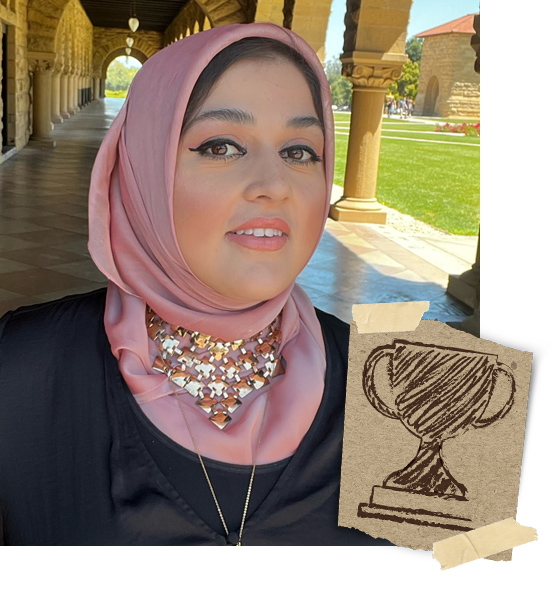Diversity Champion: Dr. Nura Sediqe
April 10, 2024 - Emily Jodway
 Growing up in an Arab American community, Dr. Nura Sediqe learned the importance of service and giving back to one’s community very early on. Throughout her life, she has seen firsthand people from backgrounds similar to her own working hard to make change happen, which has inspired much of her work and research. An assistant professor in the Department of Political Science and a core faculty member in the Muslim Studies program, Sedique is the Diversity Champion for Arab American History Month.
Growing up in an Arab American community, Dr. Nura Sediqe learned the importance of service and giving back to one’s community very early on. Throughout her life, she has seen firsthand people from backgrounds similar to her own working hard to make change happen, which has inspired much of her work and research. An assistant professor in the Department of Political Science and a core faculty member in the Muslim Studies program, Sedique is the Diversity Champion for Arab American History Month.
At just five years old, Sediqe and her family were forced to uproot from their home in Kuwait and enter the United States as political refugees of the Gulf War. They settled in Toledo, Ohio, home to one of the oldest Arab American communities in the country, with Sediqe’s uncle. Despite not being Arab by ancestry, Sediqe and her family immediately immersed themselves in the Arab American community and culture. It was there that she first experienced the interconnectedness and support the Arab American people have for one another.
“The transition was pretty seamless because it’s a very old well-integrated community, and they welcomed us with open arms,” she explained. “I have a strong cultural affinity to the folks there because it’s very much the community that raised me.”
This cultural affinity has followed Sedique throughout her academic and professional career. She saw college as an opportunity to further explore her cultural heritage and ancestry, and to better understand the history of the communities she came from, both of which influenced her decision to begin civil rights work in Washington, D.C.
While working as a research director for the NAACP Legal Defense Fund, she witnessed firsthand the disparities in political power among Arab Americans and Muslims in America. When she went on to pursue her master’s degree at Harvard, she centered her research around this idea of limited political power, and what motivates individuals to stay involved in public service even in the face of these barriers.
“My initial work was on American Muslims, and trying to understand what mobilizes folks to get involved in a post-9/11 era where there was a lot of targeted discrimination and barriers facing them, yet people still wanted to mobilize,” she said. “A lot of it is this deep sense of experiencing marginalization and feeling a sense of responsibility towards building a better life for their community. I’ve found that people who feel this sense of responsibility to uplift their community are the ones that are politically mobilized.”
She continues this research today, in addition to teaching courses centered around racial inequality and public policy. She describes teaching as a “gift and an honor,” and says she never could have imagined the impact she has been able to have on students. She has witnessed throughout her career the evolving role of educators and their ability to impact students and increase representation in the classroom.
“I’ve had many instances of students coming up to me, telling me I’m the only minority faculty member they’ve ever had teach a class, that they are taking my class because I come from a diverse background,” she said. “I never thought that was a reason that people would take my class, and what a difference it makes, particularly for women, to have a woman from a minority background as an educator.”
She also mentioned her unique experience at MSU and what makes it stand apart from other universities. In addition to housing a program specifically for Muslim studies, Arab American faculty can be seen from the president’s office to the faculty chairs and departments.
“The level of support and the importance to honoring Arab Americans is so present across the university,” Sediqe explained. “You’re going to find a level of support here that you may not find in other places. At MSU, I don’t have to explain who I am, from a minority standpoint. I feel seen and my experiences feel valued in terms of all the dimensions of who I am.”
In addition to celebrating the work of Arab Americans in a university setting, Sediqe also discussed Arab American Heritage Month and the unique impact this group has within the state of Michigan.
“Arab Americans are part of the fabric and backbone of Michigan, from their work in the auto industry to making it a tourist destination to those across the country and the world. And more recently, we’re seeing they’re really a vital voice in showing that you can engage in politics in meaningful ways and have your voice supported.”
For her, honoring her culture and its communities is particularly important. “Growing up in an Arab American community, service and looking out for one another were both such big cultural values,” she said. “They’re the ones that raised me to be mindful that I’m just one of millions, and that I need to positively pay it forward.”

